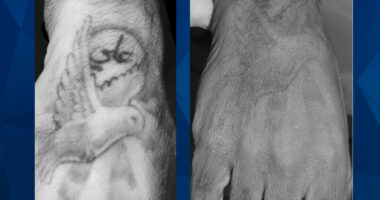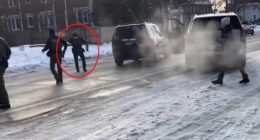Share this @internewscast.com
Donald Trump, left, shakes hands with Kristi Noem at a campaign rally on Saturday, March 16, 2024, in Vandalia, Ohio. (AP Photo/Jeff Dean)
The U.S. Immigration and Customs Enforcement (ICE) agency may face significant challenges following the loss of critical evidence in a lawsuit concerning conditions at a detention center in Illinois.
On Wednesday, the U.S. Department of Justice acknowledged the mishap in a 10-page joint status report detailing the discovery process.
Among the most crucial missing pieces is 13 days of video footage from the ICE facility located in Broadview, a suburb of Chicago, according to the report.
“Defendants have indicated that some video between October 19, 2025, and October 31, 2025, has been irretrievably destroyed and therefore cannot be produced on an expedited basis or at all,” the filing states.
The plaintiffs are taking steps to address the situation and have indicated they are “in the process of hiring an IT contractor” to collaborate with ICE’s discovery liaison and attorneys “to attempt to resolve issues concerning the missing video, including the potential recovery of any content.”
While efforts to retrieve the missing footage will continue, the plaintiffs have indicated that this issue is not their primary concern, as noted in the status report.
“While Plaintiffs intend to explore the issue of missing footage, Plaintiffs have communicated to Defendants that they are most concerned with obtaining the available surveillance videos as quickly as possible,” the joint filing by the government and plaintiffs goes on.
The underlying class action litigation was filed on Oct. 30, premised on alleged violations of the Fifth Amendment due to confinement conditions at Broadview, the First Amendment due to counsel access issues, as well as various alleged violations of due process, internal ICE rules, and the Administrative Procedure Act (APA), the federal statute which governs the behavior of administrative agencies.
The lawsuit begins with the following allegations:
Federal authorities are conducting a massive and inhumane immigration enforcement operation in the Chicago area—Operation Midway Blitz. Under Defendants’ authority, huge numbers of people are being arrested and detained. Most have been brought to what is being used as a de facto immigration detention facility right outside the city limits…where Defendants are perpetrating mass constitutional violations.
ICE agents are alleged to have violated a rule for immigration officers which reads: “The use of threats, coercion, or physical abuse by the designated immigration officer to induce a suspect to waive his or her rights or to make a statement is prohibited.”
Specifically, the lawsuit alleges that when detainees requested “basic necessities” from ICE, officers responded “with threats, abuse, or contempt.” The filing goes on to allege many detainees report “being belittled or ignored by officers when they asked for food and water.”
One of the named plaintiffs in the class action alleges that she and others “were denied water for 13 hours” as ICE officers pretended “they did not hear the requests,” according to the filing.
“When people asked for necessities, officers would insult detainees or make light of their suffering,” the lawsuit goes on. “She saw a man who was very ill and appeared to be having a heart attack. The officers at Broadview laughed at him and made light of his medical emergency.”
On Nov. 4, Senior U.S. District Judge Robert W. Gettleman, a Bill Clinton appointee, signed off on a limited version of the plaintiffs’ request for expedited discovery and set initial deadlines.
“Counsel are to confer regarding the individuals to be deposed, the length of time needed for the depositions, records on the amount of people being housed in the Broadview ICE facility cells, and a discovery plan,” the minute order reads.
On Nov. 5, the court issued a temporary restraining order directing ICE to maintain a certain level of standards at the facility in accord with a laundry list of commands. The court also turned over discovery supervision to U.S. Magistrate Judge Laura K. McNally.
On Nov. 7, McNally directed the parties to “promptly move forward with discovery” before the restraining order expires to prepare for a hearing on the plaintiffs’ requested preliminary injunction.
The preliminary injunction hearing was originally slated for Nov. 19, but after the submission of the joint status report and a subsequent hearing, the parties agreed to move the hearing back to Dec. 17.
Part of the agreed-upon delay seems to be due to lengthy emails requested as part of the discovery process, according to the status report.
“Defendants raised concerns that producing these emails, including identifying emails that may have been forwarded to other DHS officials for their response, would take close to a month to review and produce,” the filing reads.
And, while the missing days of video may come up as an issue in the future, the detainees and the Trump administration appear to have come to an agreement about some of the surveillance footage.
From the status report, at length:
Plaintiffs request surveillance video from inside the Broadview facility captured by Defendants’ equipment for a limited set of days, starting in mid-September 2025. Plaintiffs also request current video on a weekly basis. Defendants have agreed to produce video from September 28, 2025, to October 19, 2025, and also from October 31, 2025, to November 7, 2025. Plaintiffs are providing Defendants with hard drives for this production, and the parties expect that this initial production will be made shortly. The parties are discussing ways to ease the burden of production of video going forward, including by having Plaintiffs select random days for production rather than the production of all video on an on-going basis.
















